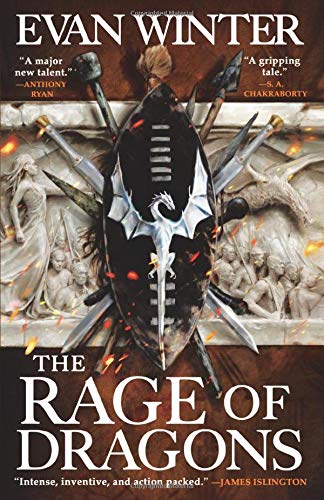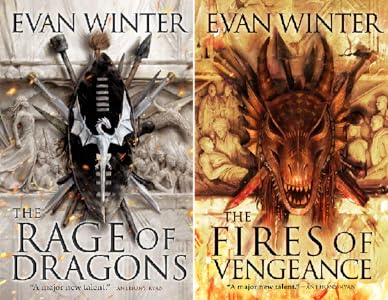
![]() The Rage of Dragons by Evan Winter
The Rage of Dragons by Evan Winter
There’s a vogue lately for fantasy inspired by cultures other than medieval western Europe or modern America, and to that I give a hearty cheer. To be clear, you’ll hardly find a bigger lover of medieval Europe in particular than I am — I spent the last couple of weeks before Christmas grading papers on Sir Gawain and the Green Knight, for example — but even I will admit that the neverending conga line of plucky yeomen rising up to shake wartorn kingdoms can sometimes get old. It’s therefore nice to see new cultural ideas coming into play. That said, I have to wonder how far some of these stories are really straying from their predecessors in the genre. The Rage of Dragons (2019) is a good example: it features African-inspired names and themes, but it’s also inescapably a story about a plucky yeoman rising up to shake a wartorn kingdom.
Still, The Rage of Dragons is certainly a well-played and gripping example of the form, and the African elements serve to give the narrative its particular and vibrant texture. The Omehi people are at once a colonizing force and a diasporic community, fleeing some terrible enemy in their homeland to seize a swath of new land from the natives. If you’re thinking that this sounds like an interesting concept, I agree. To Evan Winter‘s credit, it’s often difficult to tell whether we are supposed to like the Omehi, especially as they follow a brutal caste system filled with sneering, privileged nobles and bitter, downtrodden hoi polloi. It’s an idea with a lot of promise, though a large part of that will probably have to wait for the next book(s), as the major focus of this one is a plot that is both simpler and more direct: vengeance.

Evan Winter
Yes, it’s an “eat the rich” story. Tau Solarin is our plucky yeoman of modest means, not quite a serf but also far from an aristocrat. Tau wants nothing more from life than a quiet existence with his sweetheart, but that’s before a nobleman unjustly murders his father and sets the incensed Tau on the winding path to revenge. Along the way, he manages a lot of that kingdom-shaking I mentioned earlier, and I’m going to level with you: it’s a lot of fun. Winter has a gift for keeping his readers hooked, and I found the book difficult to put down. The action beats come fast and furious, but Winter manages to keep topping himself all the way to the finale, which is every bit the pulse-pounding set piece one expects and desires from this kind of martial narrative.
I should note here that a lot of what I just said assumes that the reader actually has some affection for Ye Olde Cinematic Fight Scene. A lot of this frankly operates on Rule of Cool, and the building blocks are going to be familiar to fans of the genre (or at least the subgenre). It probably won’t surprise readers, for instance, that Tau finds a way to be the only guy around who dual-wields swords, or that the superior method of training soldiers turns out to be not dry formation drills but intense sparring and pushing the body’s limits even further beyond.
 In fact, I’d say that the anime aficionados out there will probably be most at home here, as there’s a faint hint of shonen flavor in Tau’s journey. Like shonen, there’s also a certain degree of unapologetic cheese that just comes with the territory, from Tau’s edgy boy personality to the stupefied awe of his enemies. It’s the sort of thing that’s more about the feel than the facts, and consequently you either “feel” it … or you don’t.
In fact, I’d say that the anime aficionados out there will probably be most at home here, as there’s a faint hint of shonen flavor in Tau’s journey. Like shonen, there’s also a certain degree of unapologetic cheese that just comes with the territory, from Tau’s edgy boy personality to the stupefied awe of his enemies. It’s the sort of thing that’s more about the feel than the facts, and consequently you either “feel” it … or you don’t.
If you do, though, The Rage of Dragons is a fun and fast-paced ride with cool heroes, slimy villains, and some interesting themes moving in the background. Those themes don’t often take the stage from the more typical elements of the fantasy adventure yarn, but they nonetheless give some extra heft to what is already a very entertaining novel. And why not? This is in some ways — despite its new-school trappings — something of a throwback fantasy, full of brooding heroes, beautiful queens, and dramatic swordfights. It may not be avant-garde, but it’s the bread and butter this genre was founded on.



I’m glad I read your review! This isn’t the kind of book I normally pick up for myself, but you made it sound really fun. And I think Spouse would like it, so that’s a good deal.